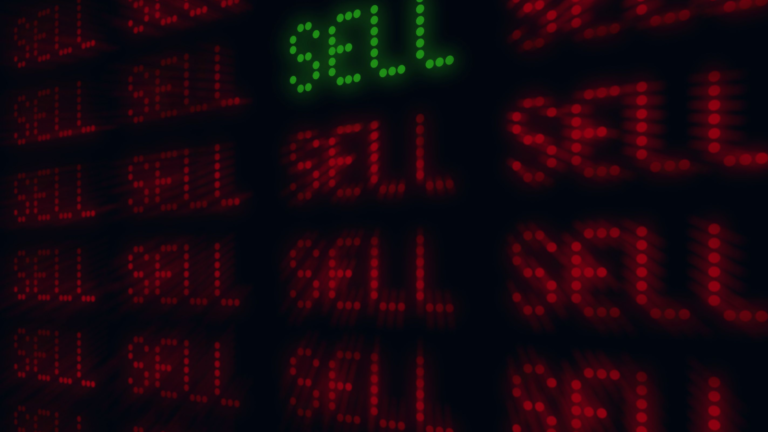While holding long-term investments, investors often find themselves at the crossroads of opportunity and risk. As October approaches a season historically known for market volatility, it’s crucial to scrutinize investment portfolios. This article contains an analysis of the financial turbulence surrounding three companies.
The first one’s lending business hangs in the balance, susceptible to the whims of the U.S. economy and interest rates. The second grapples with a decline in revenue growth and cost challenges. And the last, a blank check company, needs more clarity in completing its merger and a dearth of operational activities.
This analysis will uncover the stocks’ red flags, challenges and vulnerabilities. It’s time to assess whether it’s wise to hold onto these volatile stocks to sell or seek a safer harbor before the impending storm of October’s market meltdown.
Upstart Holdings (UPST)

Upstart Holdings’ (NASDAQ:UPST) business model highly depends on macroeconomic conditions, such as interest rates and overall economic health. If interest rates rise significantly or the economy experiences a downturn, Upstart’s lending operations could be adversely affected. Borrowers may default on their loans more frequently, leading to increased charge-offs and financial losses for the company.
Fundamentally, Upstart’s financial performance raises red flags. For instance, the company reported net revenue in Q2 2023, with a 40% contraction year-over-year (YoY). This decline in revenue is concerning, as it indicates that Upstart is struggling to maintain its growth trajectory.
Additionally, the Upstart Macro Index and concerns about borrower delinquency trends could indicate a fundamental weakness. While the company claims its underwriting models are well-calibrated, the reality is that predicting borrower behavior in a dynamic economic environment is challenging.
Furthermore, the uncertainty regarding the U.S. economy, interest rates and borrower delinquency trends is a specific concern. Economic uncertainty can make it challenging for Upstart to make accurate financial projections and strategic plans. The timing and strength of an economic recovery are uncertain, and Upstart’s performance is closely tied to these factors.
Finally, Upstart’s dependence on external funding sources is a vulnerability. The prevailing funding constraints can hinder Upstart’s ability to scale its lending operations. In a competitive lending landscape, access to capital is essential for growth. Therefore, if Upstart needs help securing funding or experiences higher borrowing costs, that could impact its profitability and growth prospects.
Beyond Meat (BYND)

The plant-based producer, Beyond Meat (NASDAQ:BYND) navigates the complex landscape of the food industry. Beyond Meat faces several specific and fundamental weaknesses that could challenge its long-term viability.
One of the most glaring weaknesses of Beyond Meat is its declining revenue growth. In Q2 2023, the company reported net revenues with a 31% YoY decrease and a 23.9% YoY decline in product volume sold. The decline is a red flag, signaling the company struggles to maintain consumer interest and market share. Several factors contributed to this decline, including weaker demand, increased competition and the cycling of significant sales from the previous year.
Additionally, Beyond Meat’s gross margin is currently a major area of concern. The company reported a gross margin of just 2.2% in the same quarter. That low gross margin clearly indicates that Beyond Meat is grappling with significant cost challenges. While there was a slight improvement compared to the previous year, this margin needs to catch up to what is needed for sustainable profitability.
Notably, Beyond Meat reported four consecutive quarters of inventory reduction, a positive sign of efficient operations. The company increased its inventory in Q1 2023, reducing it again in Q2 of this year.
The nearly consistent reduction may also indicate challenges in demand forecasting and product shelf-life management. Beyond Meat faces fierce competition for shelf space, pricing power and consumer attention. As more players enter the market, maintaining market share and premium pricing becomes more challenging.
Finally, Beyond Meat’s strategy includes
partnerships with fast-food chains like McDonald’s (NYSE:MCD). The overreliance on partnerships can be risky, as it limits the company’s control over its destiny and exposes it to potential vulnerabilities if partnerships do not perform as expected.
Digital World Acquisition (DWAC)

Digital World Acquisition (NASDAQ:DWAC) is weak for several reasons. It is important to note that the company formed as a blank check company to merge with another business. However, its financial condition and operational status raise concerns about its long-term viability and potential risks for investors.
Fundamentally, Digital World Acquisition’s primary purpose is to effectuate a business combination with one or more businesses. However, there needs to be assurance that the company can complete this merger. The merger with Trump Media & Technology Group has faced delays and uncertainties, with the possibility of termination if certain conditions are not met. This uncertainty can be unsettling for long-term investors.
Digital World Acquisition has not engaged in any operational activities or generated revenues since its inception in December 2020. It is a shell company with no underlying business operations. Interestingly, the company has incurred substantial operating expenses, primarily related to legal, financial reporting, accounting and auditing compliance.
For 2022, the company reported a net loss of $15.2 million, with formation and operating expenses of over $18 million. As of December 31, 2022, DWAC had approximately $989 in cash outside of its trust account, which needs to be increased to cover its operational expenses or fund a business combination. The company’s reliance on external funding or completing a merger to secure additional capital raises concerns about its financial stability.
Finally, the company disclosed a material weakness in its internal control over financial reporting related to accounting for accruals. Digital World Acquisition has faced regulatory investigations and continued delays in its merger with Trump’s media company. These investigations and delays can disrupt the merger process and lead to additional investor uncertainties.
On the date of publication, Yiannis Zourmpanos did not hold (either directly or indirectly) any positions in the securities mentioned in this article. The opinions expressed in this article are those of the writer, subject to the InvestorPlace.com Publishing Guidelines.
